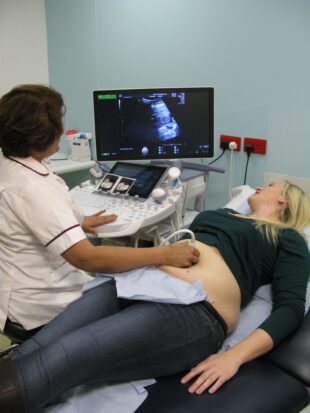If you work in ultrasound or radiology you will be well aware there’s a national shortage of trained staff. Many ultrasound departments rely on agency sonographers.

All ultrasound practitioners, including those employed via agencies, must meet a number of specific criteria before undertaking the first trimester Down’s, Edwards’ and Patau’s screening as part of the NHS Fetal Anomaly Screening Programme (FASP).
FASP offers screening to pregnant women so they can find out how likely it is their baby has Down’s (Trisomy 21 or T21), Edwards’ (T18) or Patau’s (T13) syndromes or one of a number of physical abnormalities. The first trimester combined test is the blood test and ultrasound scan offered between 10 and 14 weeks of pregnancy.
Any practitioner undertaking a fetal anomaly ultrasound scan on pregnant women, for the purpose of screening and diagnosis of a related condition should hold, as a minimum, one of the following:
- Certificate/Diploma (as appropriate) in Medical Ultrasound (CMU/DMU) of the College of Radiographers (CoR) with evidence of appropriate continuous professional development (CPD)
- Postgraduate Certificate in Medical Ultrasound (PgCert) approved and validated by a higher institute of education and accredited by the Consortium for Sonographic Education (CASE) or equivalent (the qualification should be relevant to obstetric ultrasound practice)
- Royal College of Obstetricians and Gynaecologists (RCOG)/Royal College of Radiologists (RCR) Diploma in Obstetric Ultrasound or the Advanced Training Skills Module (ATSM)
Practitioners must also complete the following e-learning resources:
- Screening for Down’s, Edwards’ and Patau’s syndromes (this new resource focuses on supporting women to make a screening decision that is right for them and should be completed every 24 months)
- nuchal translucency (NT) training resource (this resource supports practitioners undertaking the ultrasound component of the combined screening test and should be completed every 12 months)
Both e-learning resources are on Health Education England’s (HEE's) e-learning for Healthcare website. See our blog article for details of how to register.
Screening providers must check that their last Down’s syndrome quality assurance support service (DQASS) submission was green or amber flagged. Practitioners should have a copy of their most recent DQASS report.
Providers must work with practitioners to make sure image review is undertaken and appropriate action is taken as specified in the FASP ultrasound practitioners handbook.
Once all the above criteria are satisfied, there should be a process for ongoing regular image review and submission of data to DQASS, as is the requirement for other ultrasound practitioners.
You may also want to read the recent sonography workforce supply review commissioned by the Department of Health and HEE.
PHE Screening blogs
PHE Screening BLOGs provide up to date news from all NHS screening programmes – replacing our previously published newsletters.
You can register to receive updates direct to your inbox, so there’s no need to keep checking for new blogs.